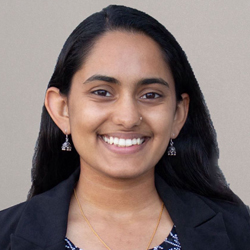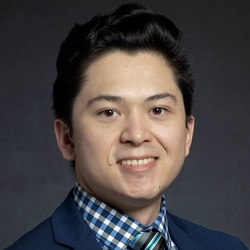For Immediate Release
Wednesday, Aug. 28, 2024
Contact:
Yvonne Hylton yvonne.hylton@nih.gov
NIH Medical Research Scholars Program welcomes the 2024-2025 class
The National Institutes of Health announces the class of 2024-2025 Medical Research Scholars Program (MRSP). Students from across the country will begin their year-long research fellowship program and participate in a comprehensive clinician-scientist development program.

Keck School of Medicine
University of Southern California
The MRSP received 116 eligible applications and upon review by a panel of NIH MSRP Board of Advisors 87 applicants were interviewed. The two-day interviews included presentations from NIH investigators, current and former program participants, and the MRSP staff.
After careful review and evaluation, the 2024-2025 class was finalized by the Board in March and consists of:
- 42 medical school participants
- 31 represented US-accredited universities
- 39 third-year and 3 second-year students
- 50% female participants
- 29% of participants are from historically underrepresented populations
The incoming scholars had an opportunity to visit the NIH-Bethesda campus and learn more about the intramural research program from current Scholars and the administrative team during the second annual MRSP Accepted Scholars Day on April 19. Students learned the importance of biomedical research training and received guidance on identifying and securing their MRSP mentor. Students then met with scientific directors and senior directors from 12 NIH institutes and centers. The scholars began working with their advisors to seek out Mentors and develop a well-crafted research plan.
Over the course of the academic year, MRSP Scholars will participate in a seminar series with invited speakers that include Institute Directors and distinguished senior investigators, engage in clinical teaching rounds, and take part in journal club presentations. They will also present their research to the NIH community and at national professional conferences.

Warren Alpert Med School
Brown University
The MRSP is supported by the NIH and other partners via contributions to the Foundation for the National Institutes of Health. Including the incoming class, 616 students have participated in the MRSP program since its inception in 2012.
I am grateful for this opportunity to develop my skills as a bench researcher, and excited to learn from the incredible physician scientists at the NIH. Pediatric oncology is a field that is constantly evolving and I look forward to contributing to this innovation through conducting research in CAR-T cell therapy. In working closely with bench to bedside researchers, I hope to learn more about how research can be leveraged to improve the care we provide our patients.
– Avani Kelekar, MS-III
Keck School of Medicine of University of Southern CaliforniaI am thankful to take part in the NIH MRSP because the support offered by the NIH community is truly unmatched. During this dedicated year of research, I look forward to developing skills under the guidance of my mentors as well as meeting and learning from my talented cohort of peers.
– Joseph Alisch, MS-III
Warren Alpert Med School of Brown UniversityI am thrilled to join the NIH MRSP, where I will work alongside leading researchers and advance my goal of becoming a physician-scientist. Through this program, I will be able to connect with like-minded individuals who are equally determined to address healthcare disparities and improve patient outcomes. I am eager to develop professionally, contribute to meaningful research, and spearhead an impactful research project.
– Amarachi Orakwue, MS-III,
University of Minnesota Medical School

University of Minnesota
Medical School
MRSP 2024-2025 scholars:
- Joseph Alisch, Warren Alpert Medical School of Brown University
- Fares Alrefai, University of Oklahoma College of Medicine
- Miranda Arakelian, Cleveland Clinic Lerner College of Medicine of Case Western University
- Daem Celestin, David Geffen School of Medicine at UCLA
- Quashawn Chadwick, Brody School of Medicine at East Carolina University
- Kenechukwu Charles-Obi, Drexel University College of Medicine
- Snigdha Chigurupati, George Washington University
- August Culbert, Cleveland Clinic Lerner College of Medicine of Case Western University
- Safa Farrukh, University of Missouri - Kansas City School of Medicine
- Yashaar Hafizka, David Geffen School of Medicine at UCLA
- Ryan Hannon, University of Connecticut School of Medicine
- Luke Jackson, Indiana University School of Medicine
- Harris Jamal, Medical College of Georgia at Augusta University
- Jalin Jordan, Perelman School of Medicine at the University of Pennsylvania
- Avani Kelekar, Keck School of Medicine of the University of Southern California
- Raphael Kirou, SUNY Downstate Health Sciences University
- Ermina Lee, University of Cincinnati College of Medicine
- Jennifer Lee, David Geffen School of Medicine at UCLA
- Roshan Lodha, Cleveland Clinic Lerner College of Medicine of Case Western University
- Darrian McAfee, University of Maryland School of Medicine
- Steven Munoz, Rutgers New Jersey Medical School
- Akanksha Nagarkar, University of Massachusetts Medical School
- Amarachi Orakwue, University of Minnesota Medical School
- Milan Patel, Hackensack-Meridian School of Medicine at Seton Hall University
- Kellie Phipps, Albert Einstein College of Medicine
- Nikhil Pramod, Cleveland Clinic Lerner College of Medicine of Case Western University
- Ruhika Prasad, Oregon Health & Science University School of Medicine
- Alexis Price-Moyer, Drexel University College of Medicine
- Jacqueline Pujol, Georgetown University School of Medicine
- Conor Reid, Cleveland Clinic Lerner College of Medicine of Case Western University
- Victoria Rogness, Cleveland Clinic Lerner College of Medicine of Case Western University
- Nicole Russell, Anne Burnett Marion School of Medicine Texas Christian University
- Yoshine Saito, University of Maryland School of Medicine
- Jein Seo, Duke University School of Medicine
- Sonakshi Sharma, Penn State College of Medicine
- Hunter Stecko, Ohio State University College of Medicine
- Bryan Torres, Tulane University School of Medicine
- Kadiatou Traore, University of Rochester School of Medicine and Dentistry
- Samantha Verling, University of Miami Miller School of Medicine
- Daniela Vultorius, Indiana University School of Medicine
- Richard Vuong, Larner College of Medicine at the University of Vermont
- Jonathan Zou, University of Rochester School of Medicine and Dentistry
###
About the NIH Clinical Center: The NIH Clinical Center is the world’s largest hospital entirely devoted to clinical research. It is a national resource that makes it possible to rapidly translate scientific observations and laboratory discoveries into new approaches for diagnosing, treating, and preventing disease. Greater than 1,600 clinical research studies are conducted at the NIH Clinical Center, including those focused on cancer, infectious diseases, blood disorders, heart disease, lung disease, alcoholism and drug abuse. For more information about the Clinical Center, visit www.cc.nih.gov.
About the National Institutes of Health (NIH): NIH, the nation's medical research agency, includes 27 Institutes and Centers and is a component of the U.S. Department of Health and Human Services. NIH is the primary federal agency conducting and supporting basic, clinical, and translational medical research, and is investigating the causes, treatments, and cures for both common and rare diseases. For more information about NIH and its programs, visit www.nih.gov.

